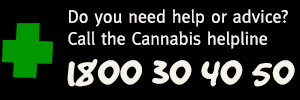Cannabis and mental health
The link between the use of cannabis and mental health problems is an issue that receives a great deal of attention in the research and general media. Although severe illnesses such as schizophrenia have received a large portion of this attention, there is also debate about whether the use of cannabis can lead to more common psychiatric disorders such as depression and anxiety.
There have been a number of studies that have explored the link between cannabis use and mental health symptoms. Strong associations are often found but this is not the same as a causal link (i.e. one causes the other).
Psychoses refers to a group of mental illnesses where people experience difficulty in distinguishing what is real and what is not real. Someone suffering from a psychosis might hear voices or see/taste/smell things that are not really there (hallucinations), or have beliefs that are not true (delusions). Hallucinations and delusions are usually accompanied by confused thinking and speech, making it difficult for other people to understand the person and for the person to function in life. Schizophrenia is the best known of the group and is one type of psychosis.
There have been reports of people experiencing psychotic symptoms after smoking a lot of cannabis or more cannabis than they are used to. This is called drug-induced psychosis. It is uncommon and the symptoms, although frightening at the time, go away when cannabis use is stopped.
Does smoking cannabis cause schizophrenia?
Evidence suggests that using cannabis may trigger schizophrenia in those who are already at risk of developing the disorder, and they may experience psychosis earlier. Any use of cannabis can double the risk of schizophrenia in those who are vulnerable, and bring on a first episode up to two and a half years earlier. Use of cannabis at a young age and heavy use of cannabis are associated with up to six times the risk for schizophrenia; especially smoking three or more times per week before the age of fifteen. Those with a vulnerability to developing schizophrenia, such as having a family history of the illness, should be strongly advised against using cannabis for this reason. Cannabis has been clearly shown to make psychotic symptoms worse in people who already have a psychotic disorder such as schizophrenia. People with existing psychotic disorders should be strongly advised and assisted to cut-down and/or cease their cannabis use.
Does smoking cannabis cause depression or anxiety?
The link between cannabis and other more common mental health disorders such as depression and anxiety is confusing, because cannabis is also often used to relieve symptoms of these conditions.
Although some people say the use of cannabis alleviates their symptoms of depression, there is evidence that smoking cannabis may make depression worse. People who use cannabis have been shown to have higher levels of depression and depressive symptoms than those who do not use cannabis. There is growing evidence to suggest that cannabis use, particularly frequent or heavy use, predicts depression later in life. Young women appear to be more likely to experience this effect.
Cannabis can lead to symptoms of anxiety, such as panic, in the short-term, which a fifth of users experience, but there is a lack of evidence pointing to cannabis as an important risk factor for chronic anxiety disorders such as panic disorder or obsessive compulsive disorder.
Are some people more at risk than others?
Generally speaking, people who start smoking cannabis at a younger age (early adolescence) and smoke heavily are more likely to experience negative consequences. This may in turn lead to mental health problems, but may also lead to more general life problems, like conflict at home or school/work, financial problems and memory problems.
Importantly, if someone has a genetic vulnerability (i.e. close family with depression, psychosis, bipolar disorder or anxiety) or has an existing mental health issue, cannabis should be avoided.
What help is available?
A good place to start is to visit your GP who can work with you to develop a mental health care plan. Rebates for services provided by healthcare professionals may be available through Medicare or your private health insurer. Psychologists, occupational therapists, social workers and nurses may have specific training to provide therapy or counselling for people with cannabis and mental health problems.
The doctor can refer you to either drug and alcohol services and/or mental health services which are available in most areas of Australia. Ideally they will use a coordinated approach that will tackle both issues at the same time. Treatment usually involves counselling and in some cases medicine is prescribed to assist with symptoms of mental health problems. This should be managed by a general practitioner (with specialist training if possible) or a psychiatrist.
| Alcohol Drug Information Service (ADIS) telephone support | |
| Australian Capital Territory | (02) 6207 9977 |
| New South Wales | (02) 9361 8000 1800 442 599 |
| Northern Territory | (02) 8922 8399 1800 131 350 |
| Queensland | (07) 3236 2414 1800 177 833 |
| South Australia | 1300 131 340 |
| Tasmania | (03) 6230 7901 1800 811 994 |
| Victoria | (03) 9416 1818 1800 888 236 |
| Western Australia | (08) 9442 5000 1800 198 024 |
| National telephone support programs: | |
| Family Drug Support | (02) 6207 9977 |
| Lifeline | (02) 9361 8000 1800 442 599 |
| Cannabis Information and Helpline | (02) 8922 8399 1800 131 350 |
| Kids Help Line | (02) 8922 8399 1800 131 350 |
| Mensline | (02) 6207 9977 |
| Online Support | |
|
National Cannabis and Prevention Information Center |
Pre-eminent Australian site for information, factsheets and self-help resources on cannabis for the community, users, families and workforces. |
|
Reduce your use |
Free online therapy program developed by NCPIC to help cut back or stop cannabis use. It is a six week program that provides advice and support. |
|
Turning Point online counselling service www.counsellingonline.org.au/en |
Free online counselling with a professional clinician for anyone seeking help with their own drug use or the drug use of a family member, relative or friend. Counselling Online is available 24 hours a day, 7 days a week, across Australia. |
|
Somazone www.somazone.com.au |
A website where much of the content is provided by young people and managed by the Australian Drug Foundation. It offers an anonymous space for young people to ask questions, share stories and get help for mental health, drug use and other issues. |
|
Dual Diagnosis www.dualdiagnosis.org.au |
A resource repository created to contribute to better outcomes for persons with co-occurring substance use and mental health disorders. |
|
Headspace www.headspace.org.au |
Website of the national youth mental health foundation for young people 12-25 to get health advice, support and information. |
|
eheadspace www.eheadspace.org.au |
Provides online and telephone support and counselling to young people aged 12 to 25. |
|
Reachout www.reachout.com.au |
Australia’s leading online youth mental health service provides information, stories and support network to other young people who have been through similar issues. Offers factsheets, stories, forums, videos and an SMS Tips service. |
|
Lifeline Online Chat www.lifeline.org.au/Get-Help/Online-Services/crisis-chat |
Provides support through chatting online, service is available 7 days a week from 8pm – midnight. |
|
Beyond Blue www.beyondblue.org.au |
Provides information and resources around the issues of depression, anxiety and other related disorders. |
|
Youth Beyond Blue www.youthbeyondblue.com |
Youth Beyond Blue offers special focus for younger people 12-25 years facing these issues. |
|
Know Cannabis www.knowcannabis.org.uk |
Website where people can assess their cannabis use, its impact and how to make changes. |














